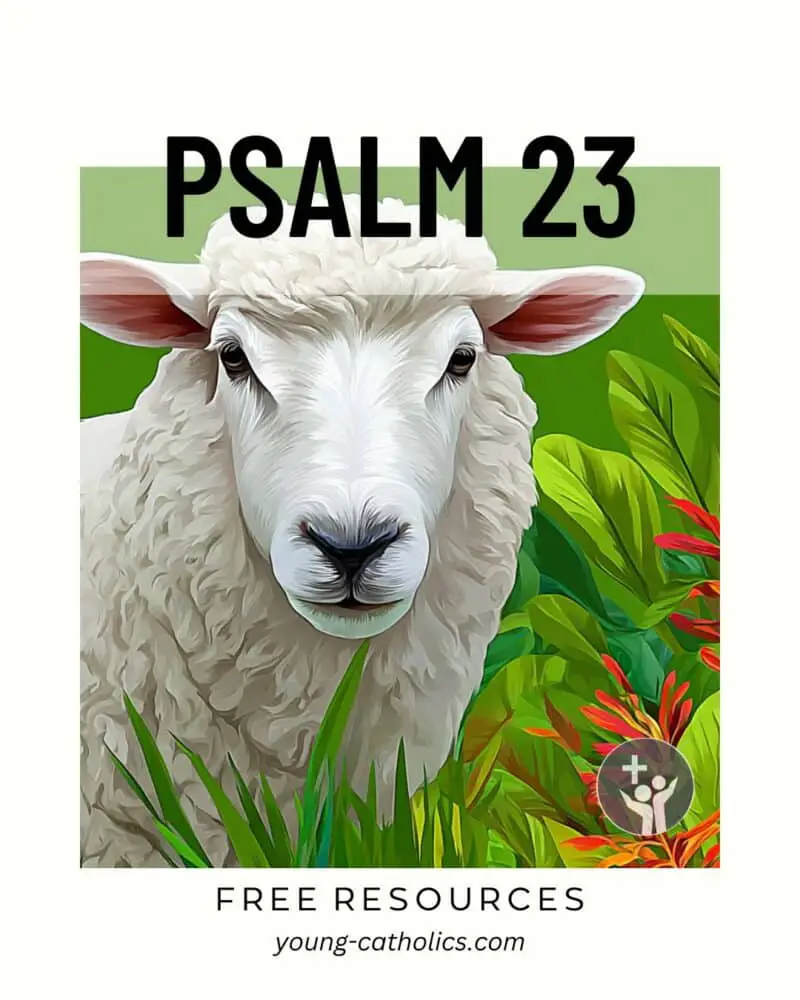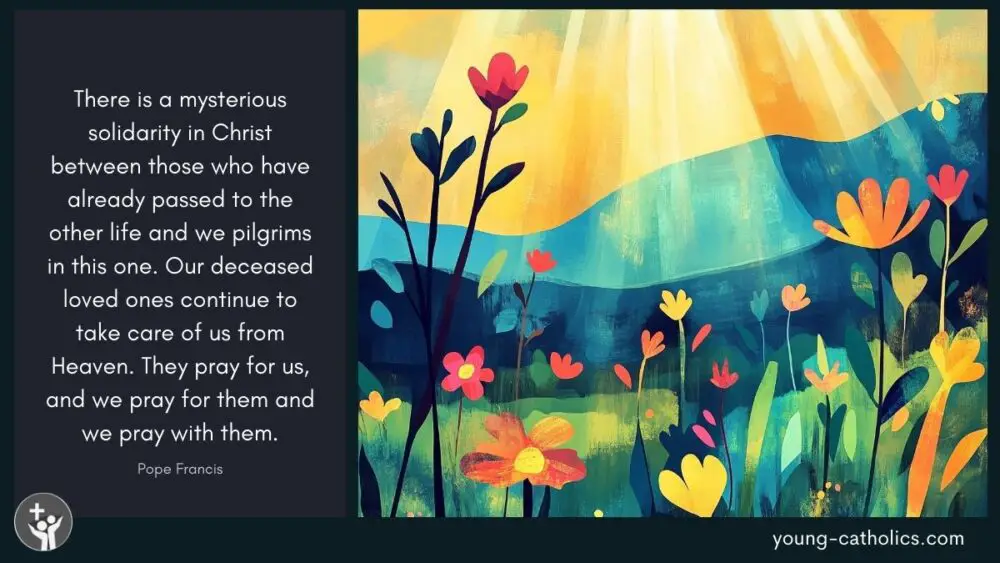All Souls Day
Feast Day: November 2

All Souls’ Day is a day when Catholics pray for the souls of the dead. It is celebrated on November 2 every year. On this day, we remember those who have died, especially those in Purgatory. We pray that God will help them on their journey to Heaven.
The Catholic Church teaches that Purgatory is a place where souls are purified before entering Heaven. Some souls are not ready to enter Heaven right after death. Our prayers can help them. This is why All Souls’ Day is important.
On All Souls’ Day, Catholics often go to Mass and pray for the dead. Many visit cemeteries to pray for their loved ones who have died. The Church encourages us to pray for all the souls in Purgatory, not just our own family or friends.
All Souls’ Day is different from All Saints’ Day, which is the day before. All Saints’ Day honors all the saints in Heaven. All Souls’ Day focuses on helping those still waiting to enter Heaven. Both days remind us of the hope we have in eternal life.
Helping Souls on Their Journey
Purgatory is a place where souls go after death if they are not fully ready for Heaven. These souls are not bad people, but they need to be purified before they can be with God. They need to be made clean from sins that have not been fully repaired. This is what the Church teaches about Purgatory.
Learn more about Purgatory here.
The souls in Purgatory cannot pray for themselves. They depend on the prayers of the living. This is where All Souls’ Day comes in. On this day, Catholics pray for the souls in Purgatory to help them reach Heaven. Our prayers help speed up their time in Purgatory.
All Souls’ Day is important because it reminds us to care for others, even after death. It is a day when we show love for our deceased family members and friends. It is also a chance to help other souls who have no one to pray for them. Every prayer makes a difference.
The Church teaches that we are all part of one family. The souls in Purgatory are still connected to us. We can help them with our prayers, just like we help each other on earth. All Souls’ Day is about that love and care we show for each other.
When we pray for the dead, we follow the example of early Christians. From the beginning, Christians have prayed for the dead, asking God to bring them to Heaven. This tradition continues today, especially on All Souls’ Day.
In this way, All Souls’ Day reminds us of our connection to those who have gone before us. Our prayers help the souls in Purgatory, and we believe one day, they will be with God in Heaven.
Where All Souls’ Day Began
The practice of praying for the dead goes back to the early Church. Christians have always believed that prayers could help those who have died. Even in the early centuries, people would pray for the souls of loved ones, especially during the Mass. This belief grew stronger over time.
In the 10th century, a monk named St. Odilo of Cluny helped to officially start All Souls’ Day. St. Odilo was the leader of a monastery in France. He wanted to set aside a special day to pray for all the souls in Purgatory. In the year 998, he declared that November 2 would be All Souls’ Day. This practice spread to other parts of the Church.
Soon, All Souls’ Day became a part of Catholic life across Europe. Different countries had their own customs for honoring the dead. Many people would go to Mass, pray, and visit cemeteries to remember their loved ones. Over time, these customs became a tradition that we still follow today.
In the Middle Ages, the Church strongly encouraged prayers for the dead. People were reminded that their prayers could help the souls in Purgatory. The idea of offering Masses and prayers for the dead became very important. This was a key part of All Souls’ Day.
Over the centuries, the Church continued to teach about the importance of praying for the dead. All Souls’ Day became a fixed part of the Church calendar. Today, Catholics around the world celebrate it in much the same way, with Masses and prayers for the souls in Purgatory.
All Souls’ Day has grown into a day of great love and care for those who have died. It is a day to remember that we can help the souls in Purgatory on their way to Heaven.
How the World Honors the Dead
All Souls’ Day is celebrated in many different ways around the world. The central practice for Catholics is going to Mass and praying for the dead. In most places, special Masses are offered for the souls in Purgatory. People pray that their loved ones will reach Heaven soon.
In many countries, it is common to visit cemeteries on All Souls’ Day. Families clean and decorate the graves of their loved ones. They bring flowers, candles, and sometimes food to honor the dead. This is a way to show respect and remember those who have passed away.
In Mexico, All Souls’ Day is connected with the Day of the Dead, or Día de los Muertos. Families build altars with pictures of their loved ones, along with their favorite foods and items. They believe this helps to remember the dead and celebrate their lives. It is both a day of prayer and a day of celebration.
In the Philippines, All Souls’ Day is known as Araw ng mga Patay. It is a time when families gather at cemeteries to pray, eat, and spend time together. Some even stay overnight at the gravesite. This shows the strong family bond and the respect for those who have died.
In Europe, especially in countries like Poland and Italy, people light candles and offer prayers for the dead. The cemeteries are filled with light as families come together to honor their ancestors. This tradition has been passed down through many generations.
Though the customs vary, the main focus of All Souls’ Day remains the same: praying for the souls in Purgatory. No matter where in the world, Catholics remember their dead with love, prayer, and hope that one day they will enter Heaven.
A Loving Help for the Souls
Praying for the dead is one of the greatest acts of charity we can do. The souls in Purgatory cannot pray for themselves. They depend on our prayers to help them move closer to Heaven. When we pray for them, we are showing love and care for their needs.
Praying for the dead is also one of the Spiritual Works of Mercy. It falls under “Pray for the living and the dead,” reminding us that our prayers can help others, both on earth and in Purgatory. By doing this, we offer them spiritual support and help them move closer to Heaven.
Learn more about the Spiritual Works of Mercy here.
This is an act of mercy because it helps those who are suffering in Purgatory. These souls are being purified so they can enter Heaven, but they need our help. Just like we help those in need on earth, we can help the souls in Purgatory through our prayers and sacrifices.
Praying for the dead also shows our belief in the Communion of Saints. This means that the living, the dead in Purgatory, and the saints in Heaven are all connected. We are part of one family in the Church. By praying for the dead, we are helping our brothers and sisters reach their final home with God.
It is also a way to honor and remember our loved ones who have passed away. Our prayers for them are a way of keeping them close to us, even though they have died. It is a comforting thought to know that we can still do something for them.
Offering prayers for the dead is not only a duty but a privilege. It reminds us to look beyond ourselves and to think of others, even those who are no longer with us. Through prayer, we can give them a gift that has eternal value.
In the end, praying for the dead helps us grow in love and compassion. It teaches us to think of others and their needs, especially those who cannot help themselves. This is what makes it a true act of charity and mercy.
Two Days, One Purpose: Honoring the Dead
All Saints’ Day and All Souls’ Day are two important days in the Catholic Church, but they focus on different groups of people. Both are about remembering those who have died, but in different ways. All Saints’ Day is on November 1, and All Souls’ Day is on November 2.
All Saints’ Day honors all the saints who are already in Heaven. These are people who lived holy lives and are now with God. Some of these saints are well-known, like St. Francis of Assisi or St. Teresa of Calcutta, but many others are unknown to us. On this day, we celebrate all of them and ask for their prayers.
All Souls’ Day, on the other hand, is about praying for those who have died but are not yet in Heaven. These are the souls in Purgatory who still need to be purified before they can enter Heaven. On this day, we pray for them and ask God to help them on their journey.
The two days work together. All Saints’ Day reminds us of the hope of Heaven and the example of the saints. All Souls’ Day reminds us of our duty to pray for the souls still in need of our help. Both days teach us that we are connected to those who have died, whether they are in Heaven or Purgatory.
In short, All Saints’ Day is a celebration of those already in Heaven, while All Souls’ Day is a day of prayer for those still waiting to get there. Both days help us remember the importance of eternal life and our connection to the whole Church, in Heaven and on earth.
Ways to Remember and Pray
There are several practical ways Catholics can observe All Souls’ Day. One of the most important is attending Mass. On this day, many parishes hold special Masses for the souls in Purgatory. By going to Mass, we pray for the dead and offer the sacrifice of the Eucharist for their benefit.
Another common practice is visiting cemeteries. Many Catholics visit the graves of their loved ones to pray for them. This is a way to show respect and remember the dead. Some people bring flowers or candles to place at the graves. While there, they can say prayers like the Rosary or other prayers for the souls in Purgatory.
Offering specific prayers for the dead is a powerful way to help them. The Church encourages prayers like the Eternal Rest prayer, which asks God to grant peace to the souls in Purgatory. The Rosary is also a popular choice, as it asks for Mary’s intercession for those who have died.
Another way to participate is by offering sacrifices or acts of penance for the souls in Purgatory. This could mean fasting, giving up something for a day, or offering a small act of charity. These sacrifices, when united with prayer, can help the souls move closer to Heaven.
In these simple ways, Catholics can participate in All Souls’ Day and show love for the dead. Each action, no matter how small, helps the souls in Purgatory and brings us closer to God and each other.
Daily Mass Readings for the Commemoration of All the Faithful Departed (All Souls’ Day)
- First Reading: Wisdom 3:1-9: The just are safe with God, appearing dead only to the foolish. They are tested like gold and will be greatly blessed. In the future, they will shine and rule, forever guided by God’s love and wisdom.
- Responsorial Psalm: Psalm 23: The Lord is my shepherd who provides and protects. He leads me through life’s challenges and blesses me. I will live in His house forever, surrounded by goodness and kindness.
- Second Reading: Romans 6:3-9: Through baptism, we die and rise with Christ, freeing us from sin’s grip. This unites us with His resurrection, confirming that death no longer holds power over Him or us.
- Gospel: John 6:37-40: Jesus assures that anyone who comes to him will not be turned away. He is doing the will of the Father, which is to lose none that the Father gives him but to raise them up at the last day. Eternal life is promised to those who believe in him.
Homilies, Commentaries, and Reflections
- Remembering and Praying for the Dead (Reflection and Questions)
- A Legacy of Love and Memory (USCCB)
- Somewhere Between Grief and Hope (Order of Preachers)
- Jesus Doesn’t Want to Lose You (Dynamic Catholic)
- Understanding Resurrection (Word on Fire)
- Faith, Prayer, and Comfort (USCCB)
- I Ain’t Afraid of No Ghosts (Fr. Mike Schmitz)
Remembering and Praying for the Dead
All Souls’ Day reminds us that life does not end with death. It helps us think about those who have passed away and how we are still connected to them. We believe that death is not the end, but a journey to be with God. For some, this journey involves a time of purification in Purgatory. Our prayers can help these souls move closer to Heaven.
This day is important because it teaches us to pray for others, even after they have died. Praying for the dead is an act of love. It shows that we care for their souls and want them to be at peace with God. By remembering to pray for those who have gone before us, we continue to show them love and support.
All Souls’ Day also helps us think about our own lives. It is a reminder that one day we will face death too. This reflection can help us live with more purpose. It can encourage us to focus on things that matter, like our relationship with God and how we treat others. Life is a gift, and we should use it well.
Finally, All Souls’ Day reminds us of hope. We believe in eternal life, and that gives us hope for the future. Even if we face suffering or loss, we can trust that God has a place for us in Heaven. This day is not just about remembering the dead, but also about trusting in God’s promise of eternal life.
Reflection Questions:
- How does praying for the dead strengthen your faith in eternal life?
- How do you show love for those who have passed away?
- In what ways can All Souls’ Day help you think about how you live your life?
A Legacy of Love and Memory
In this All Souls’ Day reflection, Deacon Arthur Miller shares the idea that each person’s life is like a library, filled with memories, love, and lessons. Just as libraries hold knowledge, our loved ones hold beauty and experiences that live on even after they pass.
Reflecting on a recent funeral and baptism, Deacon Miller describes how life’s cycle is filled with moments that shape us. Although grief remains, memories can soften pain over time. We honor those we love by carrying forward their kindness, joy, and the beauty they showed us, ensuring their legacy continues to inspire.
Somewhere Between Grief and Hope
In this All Souls’ Day reflection, Fr. Richard Ounsworth discusses the balance between grief and hope as Christians remember and pray for the dead. He emphasizes that, unlike others who grieve without hope, Christians face death with honesty and courage. Our mourning is real, and our tears help us see beyond illusions, reminding us of the resurrection and our eternal connection to those who have died.
Fr. Ounsworth compares our prayers for the dead to the women ministering at Jesus’ tomb, showing that love binds us with the faithful departed, both now and in eternal life.
Jesus Doesn’t Want to Lose You
In this All Souls Day reflection, Matthew Kelly explores the message in John’s Gospel, focusing on Jesus’ relationship with the Father and His commitment to doing the Father’s will. Kelly emphasizes that, like Jesus, we are each called to follow God’s purpose at every stage of life. However, the noise in our lives often drowns out God’s voice, making it harder to hear what He asks of us.
Taking time in silence and reflection helps us connect with God’s call. Remembering that Jesus cares deeply for each of us, we are reminded that we are entrusted to Him for eternity.
Understanding Resurrection
In this reflection for All Souls Day, Bishop Robert Barron discusses the concept of resurrection as presented in today’s Gospel, highlighting the idea of a “spiritual body” as mentioned by Paul. He references John Polkinghorne, a Christian physicist, who views the soul as the individual’s “form” or pattern. According to this perspective, God preserves this form and reconstitutes it at a higher level during the resurrection.
Bishop Barron emphasizes the comforting aspect of these beliefs, especially for those praying for their deceased loved ones, based on Jesus’ assurance that “they will be raised again.”
Resources

Lesson on Remembering the Faithful Departed (All Souls Day)
The Remembering the Faithful Departed lesson plan is a simple and meaningful way to teach youth about All Souls Day. It helps them understand why Catholics pray for the dead and how that shows love. The lesson includes discussion, prayer, and a personal challenge to pray for someone who has died.
This resource is great for use around November 2, when the Church remembers all who have died in faith. It gives youth a way to connect with Catholic teaching about eternal life, purgatory, and the Communion of Saints. It encourages hope, not fear, and helps them grow in mercy.

Why Do Catholics Pray for the Dead?
On November 2, Catholics observe All Souls Day, a time to remember and pray for their departed loved ones. This practice may seem unusual to non-Catholics, but it’s rooted in the belief in Purgatory, a state of purification. While sins are forgiven, their consequences may remain, like a broken window even after forgiveness.
In Purgatory, God repairs these lingering effects, and our prayers for the deceased express trust in His mercy. We see it as cooperation in God’s loving work to make us fit for eternal life with Him. As 2 Maccabees 12:46 says, “For it is a holy and wholesome thought to pray for the dead, that they may be loosed from sins.”

Prayer for the Grieving
The Prayer for the Grieving asks God for help in carrying the pain of loss. It reminds us that God is near, even when grief makes faith feel weak. It calls on the Holy Spirit to help us notice His care in the kindness of others. This message fits well with All Souls Day, a time when we pray for those who have died and remember that God’s love is stronger than death.
The prayer also encourages hope and trust in God. It accepts that life has both sorrow and blessings. It ends by asking for the strength to keep faith, even in sadness, and to praise God in all things. On All Souls Day, this prayer can help us place our grief and our loved ones in God’s hands, trusting in His promise of eternal life.

The Book of Wisdom: Safe in God’s Hands
The book of Wisdom teaches that true life rests with God, even when death seems to have the final word. Wisdom 3:1-9 speaks of the just being in God’s care, secure despite how they appear to others. This connects with the book’s focus on divine justice and God’s ultimate authority over life and death.
The passage also highlights God’s refining work, comparing trials to gold tested by fire. This echoes Wisdom’s larger theme that righteousness leads to glory, while wickedness fades. On All Souls Day, this reminds us that those who remain faithful are never lost but shine forever in God’s kingdom.

Psalm 23: The Shepherd Who Guides
Psalm 23 reflects the psalmist’s deep trust in God as a caring shepherd. This image ties to the larger collection of psalms where God’s protection and presence guide the faithful. It shows that God’s goodness is constant, even in the midst of suffering or fear.
The promise of dwelling in God’s house forever echoes the psalms’ emphasis on covenant relationship and belonging to the Lord. On All Souls Day, this psalm assures us that God not only leads us through dark valleys but also welcomes us into eternal rest.

The Letter to the Romans: Dying and Rising with Christ
Paul’s letter to the Romans often addresses the power of grace and the new life found in Christ. In Romans 6:3-9, Paul explains how baptism unites believers with Jesus’ death and resurrection. This theme of transformation through Christ’s victory is central to the letter.
The passage stresses freedom from sin and the hope of eternal life. It reflects the broader message that salvation is not earned but given through Christ. On All Souls Day, this reading calls us to remember that death is not the end, for we share in Christ’s resurrection life.

The Gospel of John: Raised on the Last Day
John’s Gospel often emphasizes Jesus as the one sent by the Father to bring eternal life. In John 6:37-40, Jesus promises to welcome all who come to him and to raise them on the last day. This connects to John’s larger theme that belief in Christ leads to lasting life.
The passage highlights Jesus’ unity with the Father’s will and his mission to save. This reflects the Gospel’s repeated focus on faith and trust in Jesus as the source of life. On All Souls Day, these words bring comfort, assuring that those who believe are safe in Christ’s care forever.
Social Media Graphics and Bulletin Artwork for All Souls Day
If you would like an image to be made available as a specific product (card, poster, mug, etc.) or as an extra high resolution image for personal use just post a comment about what you want and we will create a link to our online store for you.
Prayer for the Faithful Departed

Remember the souls of our loved ones with this beautiful All Souls Day image. It features a glowing candle, flowers, and a photo of someone dearly missed, capturing the spirit of prayer and hope. Perfect for parish bulletins, newsletters, or prayer guides, it invites the faithful to pause and pray for those who have gone before us.
Download it and share this reminder of love, faith, and the promise of eternal life.
Paid subscribers may download a large copy this digital artwork without watermarks, suitable for use in bulletins, social media, newsletters, etc., free of charge by clicking here. You must be logged in as a paid subscriber to access the file.
Only current paid subscribers have the rights to use the artwork.

For it is a holy and wholesome thought to pray for the dead, that they may be loosed from sins.
2 Maccabees 12:46
Questions and Answers for All Souls’ Day
What is All Souls’ Day?
All Souls’ Day is a Catholic day to pray for the souls of people who have died, especially those in Purgatory.
When is All Souls’ Day celebrated?
All Souls’ Day is celebrated on November 2 every year.
Is All Souls’ Day a Holy Day of Obligation?
No, All Souls’ Day is not a Holy Day of Obligation, but Catholics are encouraged to attend Mass and pray for the dead.
Why do Catholics pray for the dead on All Souls’ Day?
Catholics believe that their prayers can help the souls in Purgatory move closer to Heaven.
What is the difference between All Saints’ Day and All Souls’ Day?
All Saints’ Day honors saints in Heaven, while All Souls’ Day is for praying for those still in Purgatory.
What are common ways to celebrate All Souls’ Day?
Catholics attend Mass, visit cemeteries, and offer prayers for the dead.
What is Purgatory, and how does it connect to All Souls’ Day?
Purgatory is where souls go to be purified before entering Heaven. All Souls’ Day is a special day to pray for these souls.
Can we pray for non-Catholics on All Souls’ Day?
Yes, Catholics can pray for all souls, including those of non-Catholics, on All Souls’ Day.
Why do people visit cemeteries on All Souls’ Day?
Visiting cemeteries on All Souls’ Day is a way to show respect for the dead and pray for their souls.
Journey to Heaven
All Souls’ Day is a special day for Catholics to pray for the souls of people who have died. It takes place every year on November 2. Catholics believe that when some people die, their souls are not ready to enter Heaven. These souls go to a place called Purgatory to be purified. On All Souls’ Day, we pray for them to help them on their journey to Heaven.
The Church teaches that our prayers, Masses, and sacrifices can make a real difference for the souls in Purgatory. On All Souls’ Day, many Catholics go to Mass, visit cemeteries, and offer special prayers for their deceased loved ones. People bring flowers and light candles at the graves of family members to honor them. Praying for the dead is seen as an act of charity and mercy.
All Souls’ Day is different from All Saints’ Day, which is celebrated on November 1. All Saints’ Day is a celebration of the saints who are already in Heaven. All Souls’ Day is focused on praying for those who are still waiting to enter Heaven. Together, these two days remind us of the importance of eternal life and our duty to pray for others.
Your Turn
All Souls’ Day is a time to remember and pray for those who have died. You can learn more about its meaning by attending Mass, visiting a cemetery, or praying at home. Reflect on the importance of praying for the souls in Purgatory.
If you have participated in All Souls’ Day traditions, share your experience in the comments. Let’s discuss how we can continue to pray for our loved ones and help them on their journey to Heaven. Don’t forget to leave a comment below!

Leave a Reply